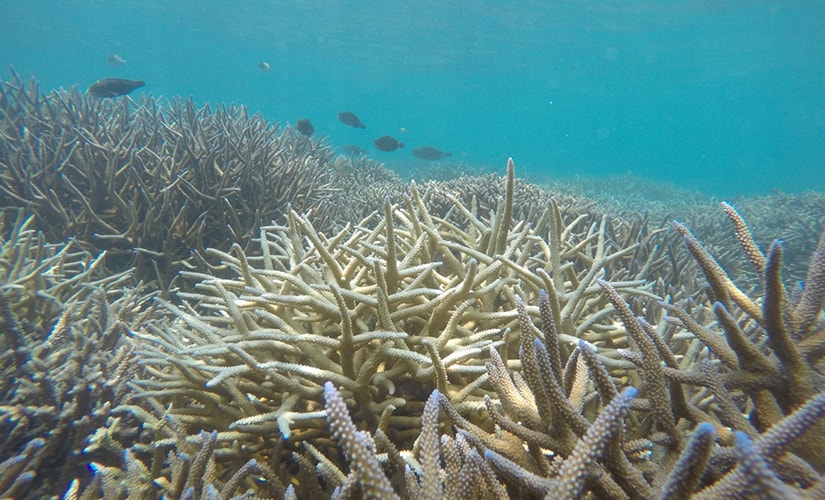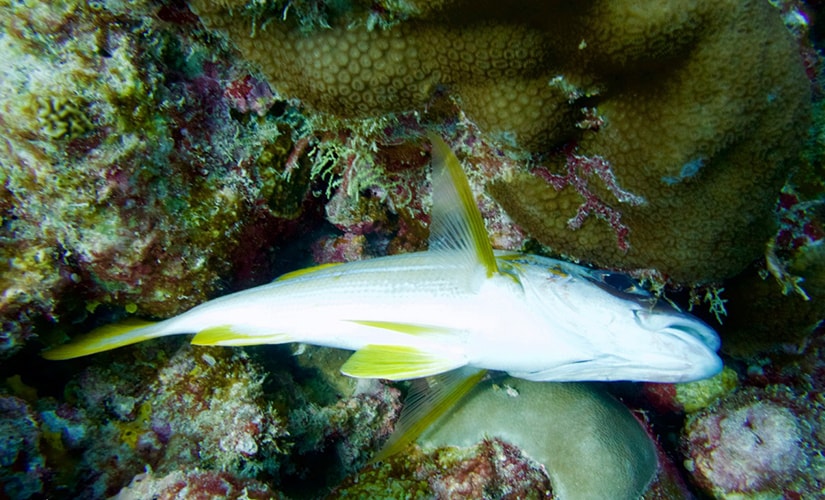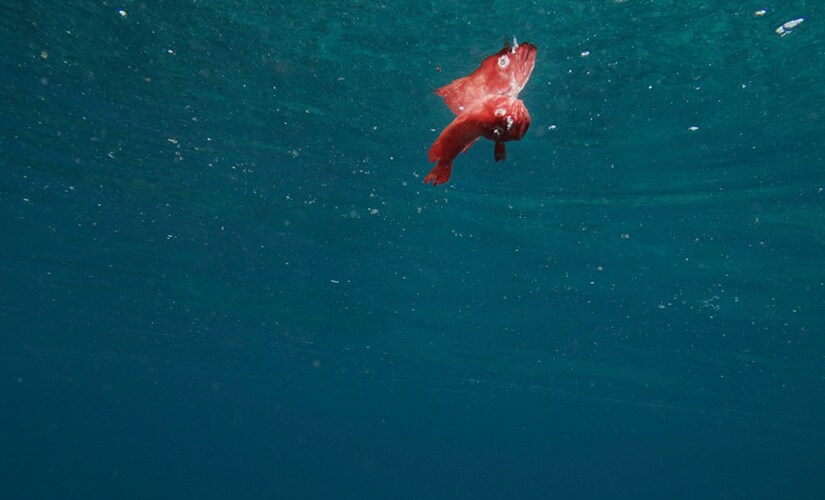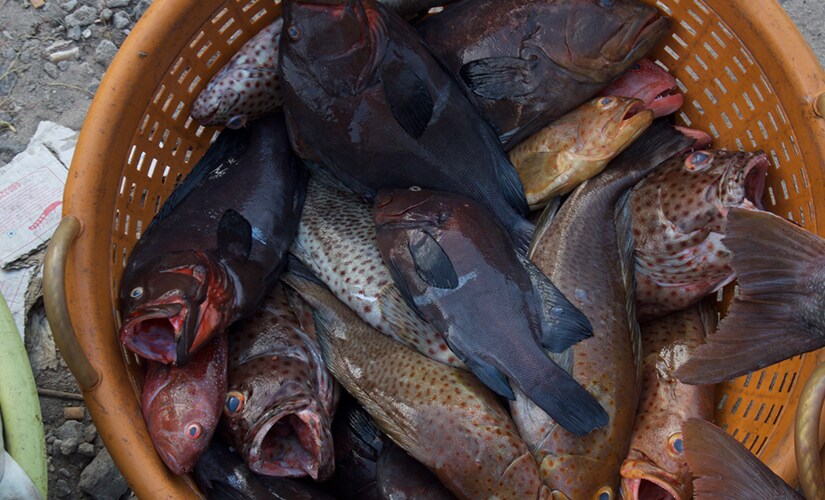The destruction in Australian waters hogs the world’s headlines. On 20 April, scientists announced that 93 percent of the Great Barrier Reef had turned white. “We’ve never seen anything like this scale of bleaching before. In the northern Great Barrier Reef, it’s like 10 cyclones have come ashore all at once,” Professor Terry Hughes, convenor of Australia’s National Coral Bleaching Taskforce, said in a press release. The El Niño Southern Oscillation’s trail of havoc isn’t limited to the Pacific alone. Its fingers of climatic mayhem reach into the Indian Ocean too. Corals are engineers of the reef, building hard white structures of calcium carbonate. They host algae called zooxanthellae that paint a psychedelic riot of colours on the white canvas. The algae are also the corals’ power houses, producing energy by photosynthesis. The symphony between algae and coral creates a tropical undersea paradise that’s home to numerous life forms. Coral reefs are to oceans what rainforests are to land. When seas heat up, corals self-destruct by spitting out their algae. Without the resident artists, reefs turn ghostly white. If the waters cool down soon, corals take their algae housemates back and survive. If not, they die. It’s akin to the trees of a rainforest dying en masse. A team of six researchers from Mysore-based Nature Conservation Foundation’s Oceans and Coasts Programme rapidly assessed how much of the Lakshadweep reefs are bleached, what kinds of coral are affected, and when the bleaching began. Every coral they’ve seen is pale. Reefs in shallow lagoons, no more than three metres deep, are white and many are dying. [caption id=“attachment_2747456” align=“alignnone” width=“825”]  The record-breaking surface temperatures turn shallow reefs ghostly pale as they bleach. Photo courtesy: Rohan Arthur[/caption] Even though winter waters ought to be cool, the average surface temperature this January was as warm as an April day. Since then it has climbed steeply. In April, the temperature breached the critical threshold above which corals bleach. If this trend continues, the reefs of the Lakshadweep are in big trouble. This is the second consecutive year of El Niño. “We expected the bleaching last year but the temperatures cooled off just in time,” says Rohan Arthur, a field biologist with the foundation. “This year is much much worse.” In April, the seas were unusually calm and so the temperature within two metres reached 35ºC. “This is ridiculously high,” Arthur exclaims. “At 33ºC, oxygen in the water gets depleted and fish start to gasp for breath.” The monitoring team found scores of dead triggerfish, snappers, groupers and others floating on the surface, stuck in the reef, or washed up on the shore. [caption id=“attachment_2747460” align=“alignnone” width=“825”]  Dying fish observed in the Lakshadweep Reefs by Nature Conservation Foundation’s Oceans and Coasts team during their Expedition Lakshadweep. Photo courtesy: Rohan Arthur[/caption] Even at 32 metres deep, the water was 31ºC warm. These high temperatures held for at least five days when the team moved on to other atolls. The year 1998 was a bad one for Lakshadweep’s reefs. About 90 percent of the coral bleached, according to Arthur’s rough estimates. He and his team have monitored developments since then. Despite the severity of bleaching, the reefs recovered over time. This is surprising as the islands hold many more people per square kilometre than most rural areas in mainland India. Traditionally, fishermen fished the reefs for food. In the 1980s, a government-sponsored programme exhorted them to target the more profitable tuna that lives in the deep sea. The lack of fishing aided the reefs’ recovery. Surgeonfish and parrotfish graze on algae that could choke corals. Groupers, triggerfish and snappers control coral predators like sea urchins and crown-of-thorn starfish. Arthur says this balance of herbivores and carnivores was critical to the recovery of reefs. [caption id=“attachment_2747468” align=“alignnone” width=“825”]  Dying fish observed in the Lakshadweep Reefs by Nature Conservation Foundation’s Oceans and Coasts team during their Expedition Lakshadweep. Photo courtesy: Rohan Arthur[/caption] “Lakshadweep is the perfect example of high density of people and high resilience of coral reefs,” says Arthur. “Other places with high resilience are uninhabited atolls in the middle of the Pacific.” However, since 2010, when a similar bleaching event occurred, the reefs have struggled to recover. Declining tuna catch forced fishermen to turn to reef fish to survive. Besides, large boats with cold storage facilities on-board spend several days fishing in these waters. Even before the corals have had a chance to recoup, they are being hit once again. There’s little we can do in the short term, says Arthur. “In the medium term, in the next few years, it will be critical to ensure that the reefs are not fished, given how important fish are to the recovery processes of these reefs.” [caption id=“attachment_2747482” align=“alignnone” width=“825”]  Freshly caught reef fish, for sale in Lakshadweep. Photo courtesy: Rohan Arthur[/caption] The team heads back to the Lakshadweep islands in early May to continue its surveys until the monsoon arrives. The El Niño system is weakening across the Indian Ocean, but it will be weeks before the waters cool off. “This is a turning point right now,” says Arthur. “What happens over the next couple of weeks can determine the trajectory of the reefs for the next 10 years.” The only things that can save the reefs, Arthur says, are an early monsoon and choppy seas.
The waters of the Lakshadweep archipelago are so warm that coral reefs are bleaching, warn marine biologists.
Advertisement
End of Article


)
)
)
)
)
)
)
)
)



